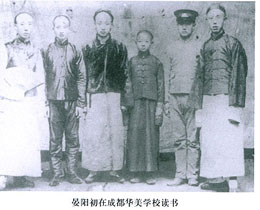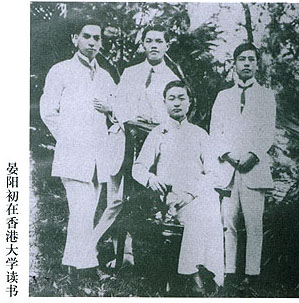 |
|
| |

Yan studied in Huamei Middle School |
Yan Yangchu was born in 1893 in Bazhong, a small town in northern Sichuan province. After Yan's father, a scholar, poet, and writer, accepted a job teaching Chinese to missionaries in the local China Inland Mission (C.I.M.) station, the missionaries urged him to send his son to a C.I.M. school. In 1907, Yan was encouraged to attend Huamei middle school in Chengdu, Sichuan's capital.
|
| In the spring of 1913, Yan ranked the first in the entrance exam of Hong Kong University. According to its items, the person ranked first in the exam could be offered the scholarship amounted to $1600. The award could only give to person with British nationality. Yan was advised to change the nationality, but he decided to give up the scholarship as it was a honor for him to be a Chinese. His courage impressed the principal of Hong Kong University a lot. |

Yan studied in Hong Kong University |
| |

Yan was awarded the honorary doctor degree of Maine University. |
After studying from 1916 to 1918, Yan completed his bachelors degree at Yale. He was a member of the Jonathan and David Society, the Chinese Christian fraternity that later become the Cheng Zhi Hui or Association for "Realization of One's Ambitions." Yan vowed to devote the rest of his life offering not relief, but "release of the pent-up, God-given powers in the people." After he returned to the United States he studied history and politics at Princeton, graduating with a Masters in 1920. He was elected president of the Chinese Students' Christian Association. In that period, the movement of exclusion |
| against Chinese broke out in USA, where Chinese businessmen, students, citizens were arrested with no reasons. Facing such unfair situation, Yan felt both upset and sad. In order to resist against American’s policy, he participated in Yale speech contest, with the topic named “The Irrational Policy of Exclusion against Chinese”. |
|
|
 |
|